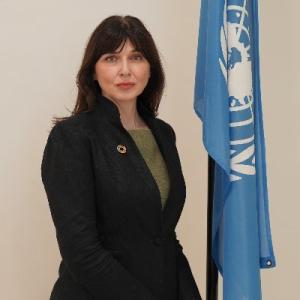Speech by UN Resident Coordinator Vladanka Andreeva at the “Decent Work for All – Leave No One Behind” Conference
Decent and inclusive work can accelerate the achievements of the Agenda 2030 in the spirit of leave no one behind.
Mr. Davud Rahimli, President of the Union of Disabled People's Organizations
Ms Ms. Kirsti Narinen, Roving Ambassador of Finland for South Caucasus
Mr. Mustafa Abbasbeyli, Chairman of the Board of the State Employment Service of the Ministry of Labor and Social Protection of Population
Mr. Musa Guliyev, Chairman of the Committee on Labor and Social Policy of the Milli Majlis, Parliament
Ms. Sabina Aliyeva, Ombudswoman
Mr. Mammad Musayev, President of the National Confederation of Entrepreneurs (Employers)
Excellencies and colleagues,
It is a great pleasure for me today, on December 3, to join you in celebrating the International Day of People with Disabilities. The global theme for this year is Fighting for rights in the post-COVID era.
The International Day of People with Disabilities should be used to recognise that people who live with disabilities, are among the most affected populations amid the COVID pandemic. Where marginalisation, discrimination, vulnerability and exploitation are every day factors for many people, the increased risk of poor outcomes have been magnified with the reduced access to routine health care and rehabilitation services, more pronounced social isolation, and a lack of emergency preparedness for people with special needs.
Leave No One Behind is the commitment of all UN Member States to end discrimination and exclusion and address the inequalities and vulnerabilities that leave people behind. We will not achieve the Sustainable Development Goals and Agenda 2030 in Azerbaijan without including people with disabilities.
According to the UN flagship report on Disabilities and Development, called “Realizing the SDGs by, for and with persons with disabilities,” one billion people, or 15 per cent of the world’s population, experience some form of disability.
At the same time, people with disabilities face drawbacks in many aspects of their daily lives – when it comes to job opportunities, accessibility to the workplace, to businesses and public spaces and institutions, as well as access to sanitation facilities and new technologies. Many of these barriers are not simply accidents of fate or a lack of availability of resources, but rather the result of discriminatory laws, policies and social practices that leave particular groups of people further and further behind.
Decent Work and Leave No One Behind
Decent and inclusive work can accelerate the achievements of the Agenda 2030 in the spirit of leave no one behind. Decent work empowers people with disabilities to be more independent and contribute to the wellbeing of their families, communities, and society at large, building together a more inclusive economy.
Therefore, it is critical to ensure the full and equal participation of persons with disabilities in all spheres of society and create enabling environment by, for and with persons with disabilities.
In 2016, the ILO reported a lack of access for people with disabilities to appropriate education, training and vocational rehabilitation.
We welcome the government’s efforts to address these issues through the 2019-2030 Employment Strategy, which aims to achieve effective employment and decent work for all, including persons with disabilities by 2025.
Projects and targets implemented by UN Entities in Azerbaijan in the field of disability
The government and civil society organisations are working together with UN Agencies in Azerbaijan to ensure the effective employment and decent work for all. Allow me to share some of the examples.
In partnership with Ministry of Labour, UNFPA and UNDP are promoting the Rights and Well-being of Women with Disabilities and Veterans of the Karabakh war . They work with larger communities and employers to protect, respect, and fulfil the rights of persons living with disabilities. Together, through the project, UNFPA and UNDP started Azerbaijan’s first-ever inclusive art school in Baku, offering free classes in drawing, knitting and wood crafting for students with and without disabilities.
From 2019 to 2020, participation of persons with disabilities in self-employment programmes declined from 22.6% to 14%, due to a combination of factors: financial insecurities, lack of confidence in business development and COVID-19 impact.
To counteract this trend, UNDP in partnership with Ministry of Labour and Social Protection is providing free training in entrepreneurship and financial support, in the form of equipment and material, for unemployed people with disabilities to start up their own business.
Despite the challenges posed by covid-19, UNICEF supported inclusive education for children with disabilities while schools remained closed through the implementation of the State Programme on Inclusive Education. In the past year, over 10,000 primary school teachers, 320 university teachers and 1,300 students of pedagogical universities received training in inclusive education approaches.
Dear colleagues,
Despite these efforts and very good results, we continue to strive for the full inclusion of people with disabilities, so that everyone can participate in society to their full potential, in Azerbaijan and around the world.
The United Nations will continue to be a strong supporter and partner to Azerbaijan’s efforts to provide effective employment and decent work for all, including persons with disabilities.
Thank you.
Speech by



